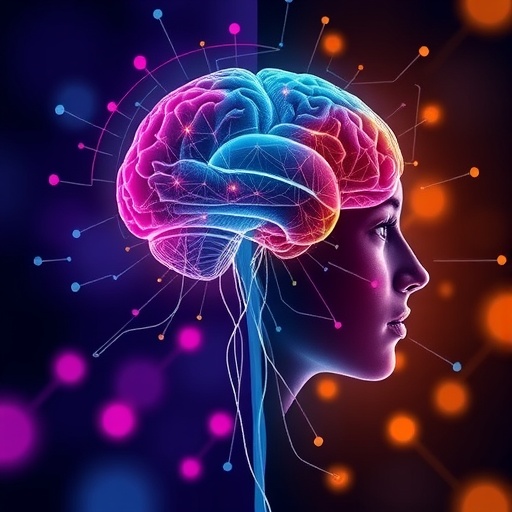Cognitive control—the brain’s ability to orchestrate thought and action in accordance with internal goals—is a fundamental aspect of our daily functioning. However, its efficiency can be profoundly influenced by our emotional state, particularly under the impact of negative emotions. A groundbreaking study published in BMC Psychology by Jiao, Zhao, Dong, and colleagues delves into the intricate relationship between emotional regulation abilities and cognitive control when individuals are primed with negative emotional stimuli. Their findings illuminate not only the neural mechanisms at play but also underscore the variability among individuals in handling emotionally charged situations, particularly within the young adult population of college students.
At the core of this research lies an exploration of cognitive control fluctuations triggered by negative emotion priming. Negative emotion priming involves exposing individuals to stimuli that elicit unpleasant or distressing feelings before they engage in cognitive tasks. This manipulation has become a pivotal method in understanding how emotions influence executive functions. The research team recruited a diverse cohort of college students, carefully categorizing them based on their capacity to regulate emotions—a skill known to modulate psychological resilience and mental health outcomes.
The brain’s executive system can be disrupted or enhanced depending on how effectively emotional responses are managed. Emotional regulation, which encompasses strategies such as cognitive reappraisal and suppression, provides the individual with tools to modulate emotional experience and its behavioral consequences. The investigators used validated psychological scales and behavioral paradigms to quantify these regulation abilities and then probed their influence during cognitive control tasks under negative emotional priming.
Using rigorous experimental design, the authors employed tasks tapping into inhibitory control, working memory, and cognitive flexibility—all components of cognitive control known to suffer under emotional distress. Participants were subjected to negative emotional stimuli, such as images or words with distressing content, before performing these tasks. The differential performance metrics and response times between high and low emotion regulation groups unveiled significant disparities: individuals with stronger regulation skills demonstrated robust cognitive control despite negative priming, whereas their counterparts exhibited marked impairments.
Neurocognitive assessments revealed that brain regions traditionally associated with executive functions—particularly the prefrontal cortex—were differentially activated based on emotional regulation capacity. Functional variations in the dorsolateral prefrontal cortex, an area critical for implementing cognitive control, suggested that enhanced emotion regulators could better suppress interference from negative affects. Conversely, those with weaker regulation showed heightened amygdala activation, highlighting a failure to suppress emotional reactivity that undermines cognitive processes.
The implications of these neural distinctions extend to everyday life and mental health. College students represent a particularly vulnerable demographic due to academic pressures and social challenges that often provoke negative emotional experiences. Deficits in cognitive control in these contexts can precipitate detrimental outcomes, such as anxiety and depressive symptoms, emphasizing the importance of emotional regulation training as a preventative measure.
One of the study’s novel contributions is its emphasis on individual differences in emotion regulation as a modulatory factor rather than treating negative emotions as a uniform disruptor of cognition. This nuanced understanding encourages personalized approaches in psychological interventions and educational programs, where enhancing emotional regulation may shield cognitive performance from the corrosive effects of stress and negativity.
Moreover, the findings reinforce a broader theoretical framework in affective neuroscience that posits emotion and cognition as deeply intertwined rather than compartmentalized faculties. By delineating how emotion regulation capacity gates the cognitive control system under duress, the study adds mechanistic insight into the dynamic interplay between affective processing and executive function.
In practice, these insights could revolutionize how academic institutions and mental health professionals approach student well-being. Incorporating emotion regulation skill-building into curricula or therapeutic settings might bolster students’ ability to maintain cognitive focus and adaptive functioning amidst emotional turbulence. The study sheds light on potential biomarkers for identifying those at risk for cognitive impairments linked to emotional dysregulation.
Furthermore, this research taps into the growing interest in emotion-cognition interactions in psychopathology, where disruptions in either domain are hallmark features. Understanding how cognitive control falters in the presence of negative emotions—modulated by individual regulatory proficiency—may pave the way for novel diagnostic tools and intervention strategies tailored to specific emotional-cognitive profiles.
Jiao and colleagues also propose that future work should extend beyond the laboratory setting, employing longitudinal designs to examine how emotion regulation training might causally enhance cognitive resilience over time. The integration of neuroimaging, behavioral, and self-report data offers a comprehensive platform to track these dynamic changes and their implications for academic success and mental health trajectories.
In summary, this study presents compelling evidence that cognitive control is not a fixed faculty but dynamically sensitive to the emotional landscape and individual regulatory capacity. The differential brain activation patterns and performance outcomes observed reinforce the importance of fostering emotional regulation as a frontline defense against cognitive disruption induced by negative experiences.
This research not only enriches our scientific comprehension of the emotion-cognition nexus but carries tangible societal and clinical impact. As the modern world increasingly exposes young adults to multifaceted stressors, equipping them with skill sets that enhance emotion regulation could prove transformative in safeguarding both mental health and cognitive vitality.
As science continues to unravel the complexities of human cognition and emotion, studies like this emphasize the need to consider individual variability and context. Ultimately, the intricate dance between feeling and thinking determines how we navigate our environments and challenges, shaping the fabric of human experience.
Subject of Research: Differences in cognitive control under negative emotion priming among college students with varying emotional regulation abilities.
Article Title: Differences in cognitive control under negative emotion priming among college students with varying emotional regulation abilities.
Article References:
Jiao, J., Zhao, S., Dong, X. et al. Differences in cognitive control under negative emotion priming among college students with varying emotional regulation abilities. BMC Psychol 13, 1259 (2025). https://doi.org/10.1186/s40359-025-03598-9
Image Credits: AI Generated




